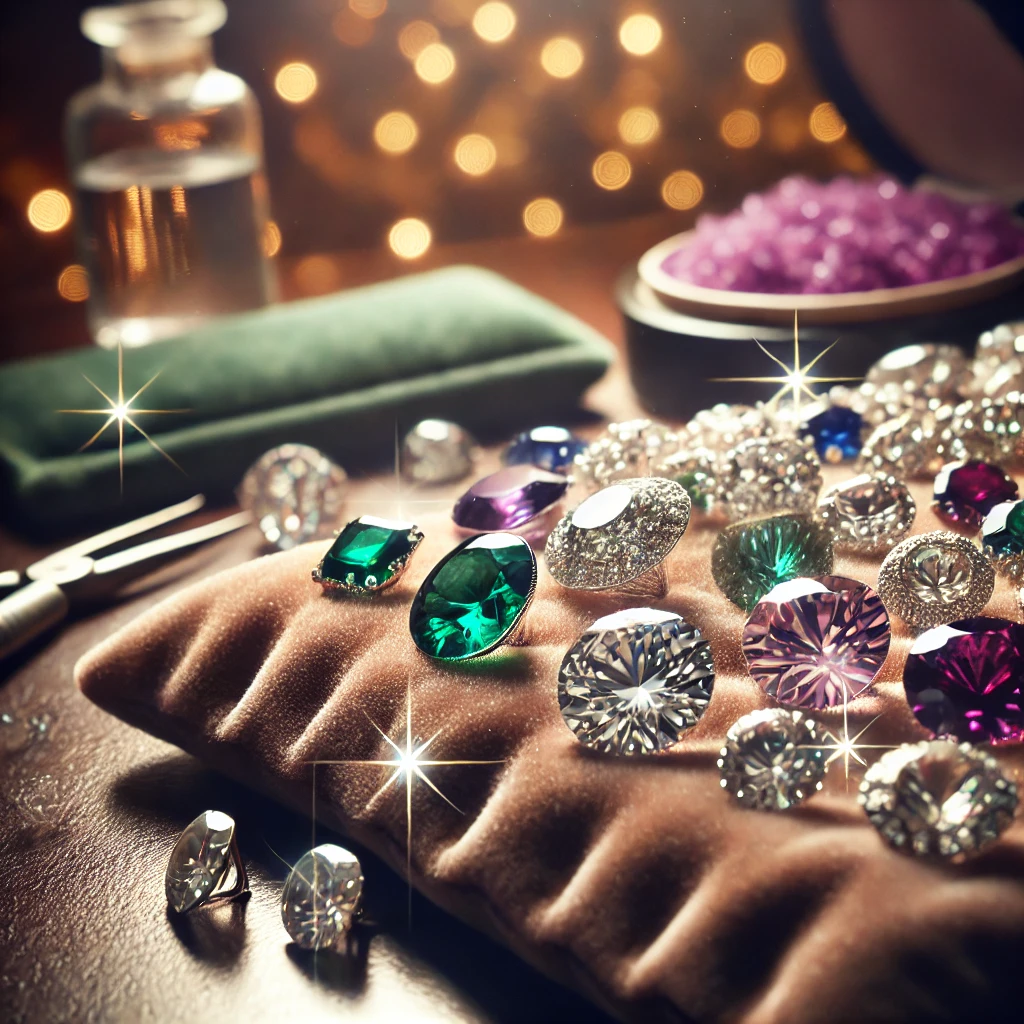How to Care for Luxury Gemstones: The Ultimate Guide to Preserving Their Brilliance

When you own luxury gemstones, you hold more than just jewelry—you possess timeless treasures with immense sentimental, historical, and monetary value. From dazzling diamonds to vibrant emeralds, each gemstone tells a story. But without proper care, even the most exquisite pieces can lose their luster. This comprehensive guide will teach you how to care for luxury gemstones, ensuring their brilliance endures for generations.
Why Proper Gemstone Care Matters
Luxury gemstones are more than accessories; they’re investments in beauty, history, and emotion. Whether it’s an heirloom sapphire ring or a custom-designed ruby necklace, improper care can lead to:
Scratches and chips from accidental impacts.
Dullness due to oil, dirt, or chemical buildup.
Irreversible damage from harsh cleaning agents or environmental exposure.
Each gemstone has unique properties. For instance, diamonds are the hardest mineral but can still chip, while opals require moisture to prevent cracking. Understanding these nuances is key to preserving their value and sparkle.
Step 1: At-Home Cleaning Techniques
Regular cleaning is essential, but methods must align with a gemstone’s needs.
Universal Cleaning Solution for Most Gemstones
Mix a gentle solution: Combine lukewarm water with a drop of mild dish soap.
Soak the jewelry: Submerge for 10–15 minutes to loosen dirt.
Scrub gently: Use a soft-bristled toothbrush to clean crevices.
Rinse and dry: Pat dry with a microfiber cloth to avoid water spots.
⚠️ Avoid for porous stones: Opals, pearls, and turquoise should never soak. Instead, wipe with a damp cloth.
Alcohol Wipes for Quick Shine
Isopropyl alcohol (70%) safely removes oils from diamonds, rubies, and sapphires. Avoid using on treated stones (e.g., fracture-filled emeralds), as alcohol can degrade coatings.
Steer Clear of Harsh Chemicals
Bleach, ammonia, and vinegar can erode metals and damage delicate gems. Even everyday products like hand sanitizer or hairspray can dull surfaces over time.
Step 2: Professional Maintenance
While DIY cleaning works for routine care, professional services address deeper issues:
Ultrasonic cleaning: Effective for diamonds and sapphires but harmful to emeralds, opals, and pearls.
Steam cleaning: Removes stubborn grime but risks thermal shock for gems like tanzanite.
Prong inspection: Loose settings are a leading cause of gemstone loss.
🔍 Pro Tip: Schedule a professional checkup annually, especially for high-value pieces.
Step 3: Daily Wear Dos and Don’ts
Protect your gemstones with these habits:
Dos
Apply cosmetics first: Perfumes, lotions, and makeup can leave residues.
Store properly: Use individual soft pouches or compartmentalized boxes.
Remove during high-risk activities: Cooking, gardening, or gym sessions expose gems to grease, dirt, and impact.
Don’ts
Expose to extreme temperatures: Sudden changes can crack gems like opals.
Wear in pools or hot tubs: Chlorine weakens metal settings and damages porous stones.
Leave in sunlight: Amethyst and citrine fade under UV rays.
Step 4: Gemstone-Specific Care Guidelines
Tailor your approach based on the stone’s properties:
| Gemstone | Durability (Mohs Scale) | Cleaning Tips |
|---|---|---|
| Diamond | 10 (Hardest) | Safe with most methods; avoid sharp blows. |
| Emerald | 7.5–8 (Fragile inclusions) | Clean with water only; never use steam. |
| Opal | 5.5–6.5 (Porous) | Wipe with damp cloth; store with damp cotton. |
| Pearl | 2.5–4.5 (Soft) | Avoid water; polish with a silk cloth. |
Step 5: Smart Storage Solutions
Improper storage causes scratches and tarnishing. Follow these rules:
Separate compartments: Prevent gems from scratching each other.
Control humidity: Use silica gel packets in storage areas to absorb moisture.
Avoid sunlight: Store boxes in dark, cool places like dresser drawers.
💡 Innovative Storage Idea: Repurpose a felt-lined drawer organizer for easy access and protection.
Step 6: Handling Repairs and Resizing
Never trust delicate gemstones to inexperienced jewelers. For example:
Emeralds often have oil treatments that require specialized handling.
Pearls drilled incorrectly can crack.
Always verify a jeweler’s expertise in luxury gemstones before proceeding.
Debunking Common Gemstone Care Myths
Myth: “Diamonds are indestructible.”
Truth: They can chip if struck at the right angle.Myth: “Ultrasonic cleaners work for all gems.”
Truth: They’re unsafe for stones with fractures or treatments.Myth: “Gemstones don’t need insurance.”
Truth: Even with careful care, accidents happen. Insure high-value pieces.
The Science Behind Gemstone Longevity
Gemstones endure through millennia due to their atomic structures. For example:
Corundum (rubies/sapphires) has a tightly packed crystal lattice, making it scratch-resistant.
Organic gems like pearls consist of calcium carbonate, which dissolves in acidic environments (even sweat!).
Understanding these traits helps you create a care routine aligned with nature.
A Personal Journey: Restoring a Family Heirloom
My grandmother’s sapphire ring lost its glow after decades of neglect. Professional cleaning revealed hidden scratches, and the prongs were dangerously loose. After repairs, its brilliance returned—proof that even “lost causes” can shine again with care.
FAQs About Luxury Gemstone Care
Q: Can I use toothpaste to clean gemstones?
A: No! Abrasives in toothpaste scratch surfaces. Stick to mild soap.
Q: How do I revive a faded amethyst?
A: Unfortunately, UV-induced fading is permanent. Prevent it by storing in darkness.
Q: Are lab-created gems easier to maintain?
A: They share the same properties as natural stones, so care requirements are identical.
Conclusion: Preserve the Legacy of Your Gemstones
Caring for luxury gemstones isn’t just about maintenance—it’s about honoring their history and craftsmanship. By following these steps, you ensure their beauty transcends time. Start today: inspect your collection, schedule a professional cleaning, and share these tips with fellow gem enthusiasts. After all, a well-cared-for gemstone isn’t just a possession—it’s a legacy.
For more expert insights, explore our guides on choosing the right gemstone or understanding jewelry appraisals.

Leave a Reply